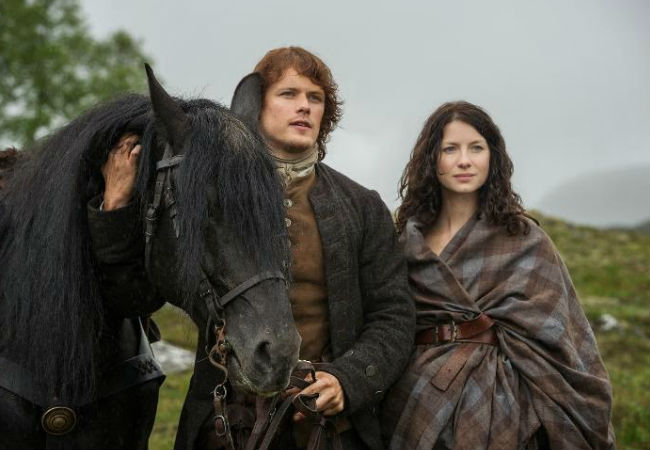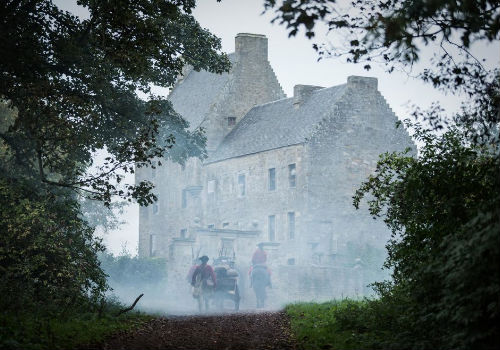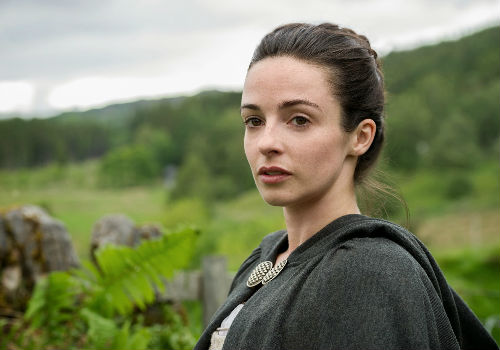
* SPOILERS AND CULTURAL CLASHES AHEAD *
Jamie: “I need you to trust me here. My family. My land. My time. I am Laird and you are my lady. We should conduct ourselves as such.”
Claire: “I’m not the meek and obedient type.”
Soooo … it’s been a while since you’ve been home, what with there being a gigantic price on your head – one that the Duke of Sandringham will hopefully soon have lifted – and as you crest over the hill that looks down upon your beloved Lallybroch, what do you, as the newly-returned Laird, think is the first order of business?
(a) Go and visit the grave of your dearly-departed father (Andrew Whipp) who died at the hands of the sadistic Captain Black Jack Randall (Tobias Menzies), overcome while watching his beloved son be whipped multiple times in the most violent way possible?
(b) Show your wife Claire (Catriona Balfe) around the estate, a small one to be sure, but one with largely happy tenants, and at which you are lord and master with dibs on the largest bedroom and free rein to fix broken waterwheels at will?
(c) Or do you, hot headed as always, accuse your sister Jenny (Laura Donnelly), quite obviously with child and with a four year old boy playing at her feet, of being a trollop and whore who brought unending shame to the family by allowing herself to be raped four years ago by the evil Captain?
If you answered (a) or (b), both of which happened eventually but not quite as quickly as you might have expected, then go to the back of the drama-writing class for you know Outlander not; if however, you picked (c) then congratulations, you know the heart and mind, and sometimes rash emotional judgement, of the handsome Jamie Frasier (Sam Heughan) and can hold your head high. (Assuming the English leave it in place, always a questionable outcome in the Scotland of this era.)
It turned out, of course, after Jenny unburdened her soul with the sort of pluck and courage she seems to have in spades, that the rape never took place, with Captain Randall not able to, ahem, humiliatingly get the requisite parts in motion (and yes that really was Tobias Menzies’ gear in that scene) – something which Jenny found oddly amusing at the time, a reaction which earned her the sort of deplorably violent response for which Black Jack is infamous – leaving the virtue of Jenny, now married to the handsome one-legged Ian Murray (Steven Cree), well and truly intact.
Which means of course that Jamie rushed to apologise?
Ah not exactly, which left things more than a tad awkward between the two obviously close and loving siblings, a situation not helped by Claire putting her foot in it once again, thanks to her inability to remember she’s not in the 20th century anymore, and suggesting in front of Jenny and Ian, and GASP! the help, that an apology would be a jolly good idea.
It was a suggestion that didn’t go down at all with Jamie and led to yet another “discussion” behind closed doors at this bi-century couple once again had to sort of what was what and when to say it.

A quieter episode than last week’s “WITCHES! BURN THE WITCHES!” episode “The Devil’s Mark, “Lallybroch”, taken from the name of Jamie’s ancestral home, was another well-wrought examination of the perpetual clash of culture and perspectives than inevitably exists when one half of the partnership is from the future and one from a far more prosaic present.
Jamie, to his credit, seems to be handling the whole “My wife is a time traveller” reveal rather nicely, happily asking Claire all about aeroplanes as they ambled homeward, and it’s to the credit of the writers that their conversation seemed entirely natural, and not the sort of sensationalist “YOU’RE FROM THE FUTURE?!” melodrama that lazy scribes might have been tempted to indulge.
It speaks to the quality of the production that the writers don’t take the easy way out; that even in their continuing examination of the gulf that exists whether they like it or not between Claire and Jamie’s life experiences, they handle it with the enlightened understanding that Claire is not necessarily the final word in all things simply because she is from the more “advanced” future.
In fact in a series of key scenes this week, Claire was, very nicely naturally, put in her place, reminded that the good citizens of 18th century Scotland are unthinking, unfeeling savages and that what Claire sees as wrong or unconscionable may also be viewed the same way by the likes of Jamie or Jenny.
Take for instance, Claire’s witnessing of one of Jamie’s tenants brutally beating his child.
Doing the right thing by stepping in and putting a stop to it, and making sure the boy is safe and well fed, her huffing and puffing that no one seemed to be as concerned as she was about his welfare was quickly cut short when it was revealed that Jenny was well aware of the boy’s mistreatment and was taking steps in her own way and time to put an end to it.
This is not to say that Claire did the wrong thing in any way; quite the contrary in fact with the former World War Two nurse doing what any sane person would do by pulling a child away from imminent danger.
But once again she had to learn that she doesn’t have a stranglehold on care and concern for her fellow man, and that Jenny for instance is just as aware in her own way that things are amiss but has to handle them within the rigid social mores of the time.

But Claire wasn’t the only one learning a lesson or two.
Jamie too, who has never been Laird of Lallybroch in his own right, and came in like the proverbial bull in the china shop telling everyone what to do without asking them, in particular Jenny, what it is they do, had to learn that asking a question here or there did not lessen his masculinity or authority in any way.
Admittedly his heavy-handed ways were driven more by insecurity and the need to appear strong than any pigheaded misogyny – I think by now the writers have Jamie’s proto-feminist stripes well and truly painted on – but the effect was the same – the alienation of the people close to him.
He had to learn, and to his credit he did, that simply because he thought there was a way to do something didn’t mean that was the way to do it (and to his credit he apologised to Jenny, she apologised and there was, as you might expect, all the feels possible).
It underlined again how nicely sophisticated the writing is in Outlander.
Rather than slapdash, roughly-wrought scenes, the writing aims for slow unfurling of observations, all bedrocked in the idea that everyone, high or low in status, male or female, 18th century or 20th century born has a thing or two to learn, and needs to remember that no one is the font of all wisdom and understanding.
Thus Outlander is as much a treatise on the universality of the human experience as it is an examination of the great differences between people from different times and cultures, eschewing in the process the almost imperialist idea that more advanced people are Good, less advanced Bad.
And that’s a refreshing way to approach any drama, driving in Outlander a show that keeps you on the edge of your seat but not at the expense of the integrity of its characters or the depth and nuance of its storytelling.
“Lallybroch”, like all the episodes in the first season so far, is a reminder that you can still have fine, engrossing drama without sacrificing intelligent, well-told, perceptive narratives in the process.
I have no doubt that next week’s episode, “The Watch”, will continue in that fine tradition …